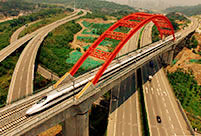

Before we explore the current Sino-US relations and analyze its future trajectory, we had better ask the following questions: Since China's reform and opening-up 37 years ago, which country has imposed the biggest influence on China? With which country has China's relationship changed the most? In which country has China established the most personal communications? With which country has China set up the largest number of negotiation mechanisms? From which country has China benefited the most, and with which country has China engaged in most wrangles and frictions?
The answer to all the above questions is the US, and this applies to all spheres of the Sino-US relations including economy, science and technology and culture.
There has been no country that has exerted such profound influence over China in history, nor has the US, since its founding, had to brace for such strong impacts from an Asian country.
These answers speak for themselves, proving that many statements concerning the China-US relationship, being that it is at a "crossroads" or comes to a "tipping point," are ill-founded. It is true that both sides face a choice, not about which path they should take, but whether they can properly position the other in their vision rather than relying on short-sighted expediencies.
Therefore, the proper Sino-US orientation is key to forging a new type of major power relationship. China, a "newcomer," ought to take on more international duties as it grows stronger, while the US should give an appropriate definition of China and leave more space for it to play its part.
As some Chinese scholars put it, the US should learn how to deal with an emerging power on an equal footing instead of attempting to boss it around.
China also needs an appropriate orientation toward the US, and especially to offer a clear vision about what role the US should play in Asia. Such an orientation matters to the trend of the bilateral relationship and China's own strategy for future development.
As the most powerful country in the world, the US is a dominant power in the political and economic order of the Asia-Pacific, having a bigger say than anyone else in regional affairs.
The WWII endowed the US with a legitimate presence in Asia, and after the war, many Asian countries have benefited from the US, in one way or another, to develop their economies.
The grand economic capacity of the US is closely related to the rise of almost all Asian countries. Some states expect Washington to be more involved in Asian affairs because they think the US can make geopolitical and military balance in the Asia-Pacific. Some countries have been maintaining close alliances with the US.
The US dominance in the Asian political and security order aims to not only prevent China from not following US arrangements but also maintain Asian stability.
The difficulty in defining the US' role is the geopolitical fact that there are still many Asian states placing their hope on the US in regional affairs. This difficulty has already emerged when China asks the US to show respect to China and deal with it equally.
China, through keeping a clear vision and without looking up to or looking down at the US' role in Asia, can grasp the big picture of Sino-US relations.
In the past three decades, there have been ups and downs in the Sino-US relationship, but the general trajectory is going upward. What both sides have achieved has been far greater than the losses they have suffered. China's future path demands a stable relationship with the US. China had to follow US mood swings, but now it is capable of affecting the US and laying out a constructive vision for the two.
 School life of students in a military college
School life of students in a military college PLA soldiers operate antiaircraft guns in drill
PLA soldiers operate antiaircraft guns in drill Mysterious “sky road” in Mount Dawagengzha
Mysterious “sky road” in Mount Dawagengzha J-11 fighters in air exercise
J-11 fighters in air exercise Top 16 Chinese cities with the best air quality in 2014
Top 16 Chinese cities with the best air quality in 2014 PLA helicopters travel 2,000 kilometers in maneuver drill
PLA helicopters travel 2,000 kilometers in maneuver drill PLA soldiers conduct 10-kilometer long range raid
PLA soldiers conduct 10-kilometer long range raid Stars who aced national exams
Stars who aced national exams
 Hefei-Fuzhou railway line put into trial operation
Hefei-Fuzhou railway line put into trial operation Pan-democrats must choose wisely for HK
Pan-democrats must choose wisely for HK China's latest air quality threat ground-level ozone
China's latest air quality threat ground-level ozone Duped by extremists
Duped by extremists Rolling through time
Rolling through timeDay|Week